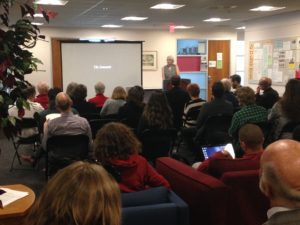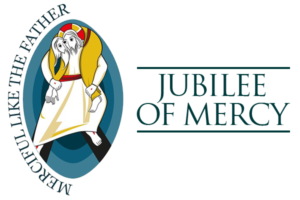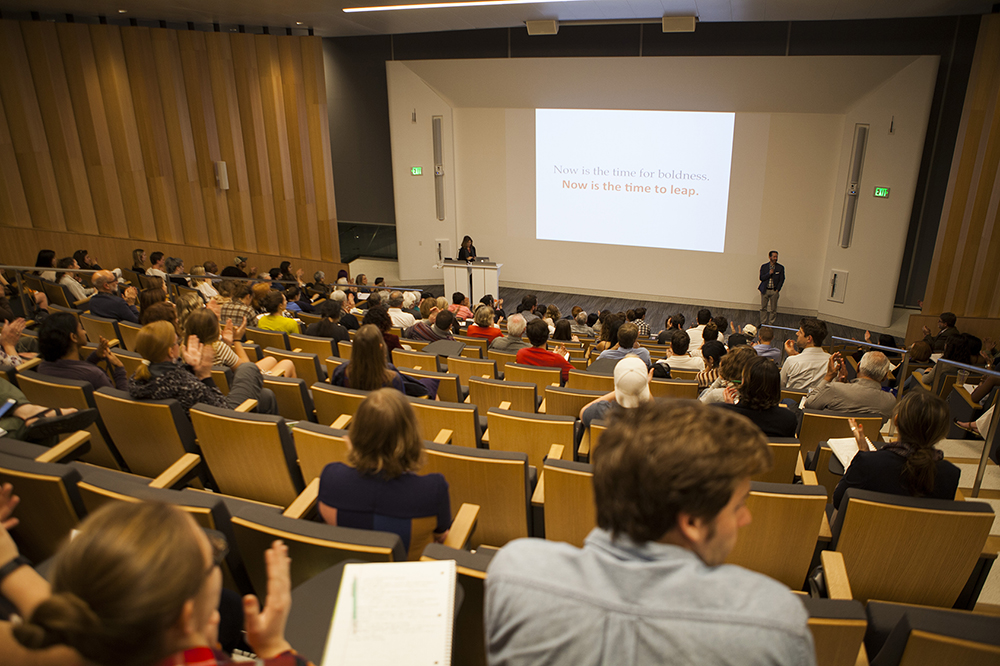The Academy of Catholic Thought and Imagination (ACTI) has recently wrapped up its first full year in operation here at LMU (the academic year from September 2015 through early May 2016). It’s been quite a ride, and now that the summer break from classes has arrived, it makes sense to pause and reflect, to take stock of what we’ve accomplished, and to think about where to go from here.
We framed our AY15-16 programming around the themes laid out in Laudato Si’, Pope Francis’s groundbreaking Encyclical on environmentalism, social justice, economic justice, and the Catholic Church. As I’ve said before, the publication of Laudato Si’ was a particular blessing for ACTI, insofar as it models just the kind of dialogue we hope to promote. It is explicitly addressed to, and encourages dialogue with, all people of goodwill; certainly it is a teaching document, but it also reminds us all that genuine dialogue requires an openness to the other who is also a teacher to us. Laudato Si’ is also inherently inter- and multi-disciplinary document. The Pope recognizes that the complexities of our contemporary environmental and social crises mean that no one mode of understanding will allow us to grasp the fullness of their truth or supply us with a silver bullet that solves our problems. Theology and philosophy are addressed in Laudato Si’, but so are economics, sociology, politics, ecology, physics, and more.
It is this sort of broad understanding of the diversity of the Catholic intellectual traditions that ACTI seeks to engage and celebrate, and this mode of open dialogue—searching for the truth and the good, willing to learn from others seeking the same—that we hope to promote.
Much of our programming last year took inspiration from Laudato Si’: the fall faculty roundtable and teach-in on the Encyclical itself, with important perspectives from economics, women’s studies, chemistry, religious studies, and more; “Climate Change: the Science behind the Rhetoric” with Nobel Laureate Dr. Jeremy Pal; “This Changes Everything” with internationally known journalist Naomi Klein; and “Laudato Si’: A Prophetic Challenge for the 21st Century” with Fr. Sean McDonagh, one of the principal advisors to Pope Francis during the drafting of the Encyclical. These four events formed the backbone of our programming, which helped the faculty and students at LMU engage in a sustained reflection on some of the major issues of our time—climate change, social and economic injustice—and to do so in explicit engagement with Catholicism, the Catholic intellectual traditions, and Catholic Social Teaching.
 There were many other events scheduled or co-sponsored around these major fora: film screenings; lectures by Emmanuel Falque (the Dean of Philosophy at the Institute Catholique du Paris), Anne O’Byrne (SUNY Stonybrook), Fr. Mark Bosco (Loyola Chicago), and others; Dr. John Haught’s lecture on “Science, Faith, and the Cosmic Future” as part of the inauguration of LMU’s 16th President, Dr. Timothy Law Snyder; Bishop Gordon Bennett’s lecture series on mercy; a book launch for new works on Pope Francis by Fr. Tom Rausch and Fr. Allan Deck; and more. These were all incredibly successful events. Tracking only the events that ACTI planned, organized, and sponsored directly we engaged something approaching 1500 people in these important discussions, and, of course, many more if we include our co-sponsored events. Attendance at a number of these events was limited by room size rather than interest, with audience members spilling into the isles and out the doors of Ahmanson Auditorium or the Life Sciences Auditorium.
There were many other events scheduled or co-sponsored around these major fora: film screenings; lectures by Emmanuel Falque (the Dean of Philosophy at the Institute Catholique du Paris), Anne O’Byrne (SUNY Stonybrook), Fr. Mark Bosco (Loyola Chicago), and others; Dr. John Haught’s lecture on “Science, Faith, and the Cosmic Future” as part of the inauguration of LMU’s 16th President, Dr. Timothy Law Snyder; Bishop Gordon Bennett’s lecture series on mercy; a book launch for new works on Pope Francis by Fr. Tom Rausch and Fr. Allan Deck; and more. These were all incredibly successful events. Tracking only the events that ACTI planned, organized, and sponsored directly we engaged something approaching 1500 people in these important discussions, and, of course, many more if we include our co-sponsored events. Attendance at a number of these events was limited by room size rather than interest, with audience members spilling into the isles and out the doors of Ahmanson Auditorium or the Life Sciences Auditorium.
The 2015-2016 academic year also saw the growth of the ACTI community with the hiring of Dr. James Taylor as Operational Director. Dr. Taylor comes to us by way of Croatia where he and his wife (a scholar of South Slavic, Russian and American literatures) spent the past several years running a very successful study abroad program, as well as an associated NGO (The European Center for the Study of War and Peace), addressing conflict, violence, reconciliation, and peace at the social, geopolitical, and interpersonal levels. Dr. Taylor’s academic work focuses on issues like the ethics of the interpersonal encounter, how religious experience (and specifically spiritual exercises) can contribute to peaceful relations, and how and whether violence is an appropriate way to manage our lives. He approaches these issues by drawing from the rich resources of the Catholic intellectual and spiritual traditions.
We also completed the hiring of a new post-doctoral scholar, sponsored by the Bellarmine College of Liberal Arts Dean, Dr. Robbin Crabtree, and the Charles S. Casassa funds. After a nationwide search we were delighted to offer Dr. Allison Edgren of the University of Notre Dame a two-year postdoctoral position with us. Dr. Edgren’s research focuses on poverty, beggars, the phenomenon of begging, and related subjects. She will be housed with her colleagues in LMU’s History Department, where she will teach classes while pursuing her research for ACTI. It is our hope to continue—and perhaps expand—this program in the future, and the arrival of Dr. Edgren presages great things for ACTI’s outreach to and engagement with a variety of departments on campus.
This past year, the ACTI community included a number of faculty fellows, who pursed their various research projects with the support of the Academy, including: Victor Carmona (Biology), Matthew Petrusek (Theological Studies), Erin Stackle (Philosophy), and Kelly Younger (English). Next year Jane Brucker (Art and Art History), Anthony Perron (History), James Plecnik (Accounting), and Tracy Voyles (Women’s Studies) will come on board as our faculty fellows, pursuing research in contemplative pedagogy and visual art, graveyards and burial practices, business practices and the “common good,” and the Catholic Church and the environment as related to Native American Nations. The diversity of this research—from art and art history, to biology, to theater, and more—indicates both the breadth of our view of the Catholic intellectual traditions, and the depth of faculty interest in engaging the same. These fellows have contributed immeasurably to the Academy’s early success, and we hope that the fruits of their research will continue to benefit their students for years to come.
Sadly, the close of the academic year also marks a loss for the Academy, as Ms. Stephanie Monson will be leaving us. She will be moving closer to her family and to a new job as Director of Salvatorian Service at Divine Savior Holy Angels Preparatory High School in Milwaukee. It would be impossible to overstate the degree to which our success in our first year depended on Ms. Monson, and we wish her and her family all the best as they embark on this new adventure, and hope that they will flourish in every way in their new home.
Such success would, of course, be impossible without the amazing support we have received from faculty and students at LMU, from the administration, and increasingly from some dedicated and interested members of the local community. We hope that everything we’ve done has lived up to the expectations they have about quality, intellectual-stimulation, and relevant programming; and we plan to continue stretching ourselves and our community in the coming years.
 Next year (academic year 2016-2017) we are organizing a number of events reflecting on mercy in honor of Pope Francis’s Extraordinary Jubilee of Mercy, including scholarly panels on refugees, prisoners and religions. We are hosting a performance of Twinsome Minds, a multimedia meditation on the 1916 Easter Rising in Ireland, as well as multiple film screenings with LMU’s renowned School of Film and Television. Events related to just war theory, beauty, and more will round out the year.
Next year (academic year 2016-2017) we are organizing a number of events reflecting on mercy in honor of Pope Francis’s Extraordinary Jubilee of Mercy, including scholarly panels on refugees, prisoners and religions. We are hosting a performance of Twinsome Minds, a multimedia meditation on the 1916 Easter Rising in Ireland, as well as multiple film screenings with LMU’s renowned School of Film and Television. Events related to just war theory, beauty, and more will round out the year.
The following year (academic year 2017-2018) ACTI will return to another yearlong theme with the launch a major initiative on “The Idea of the Catholic Church in the 21st Century.” Taking inspiration from Cardinal Newman’s famous The Idea of the University, we will be hosting a variety of events asking about the role of the university in the 21st century, and the distinctive role of a Catholic university in the same. What makes a university distinctively Catholic? What are the responsibilities of a Catholic institution qua university or college? These and other questions will help us to reflect—along with faculty, students, and staff at LMU, as well as experts and colleagues from other Catholic institutions—on who we are and who we want to become in the coming years.
Keep an eye on our website as we finalize these and other plans; we will be updating things throughout the summer to reflect our programming in the fall of 2016 and beyond. And consider joining our mailing list, which will keep you appraised of all our activities.
We hope that ACTI will continue to serve as a center for robust and engaging intellectual exchange, and that you will invite friends and colleagues to join us as we work to enrich LMU’s intellectual culture.
Brian Treanor
Academic Director
Academy of Catholic Thought and Imagination
